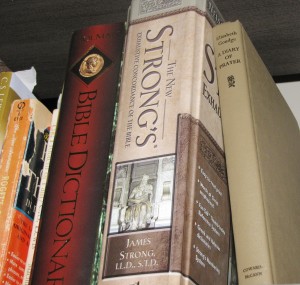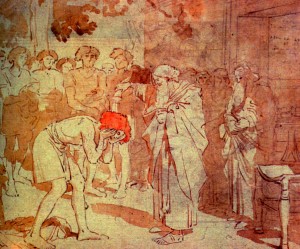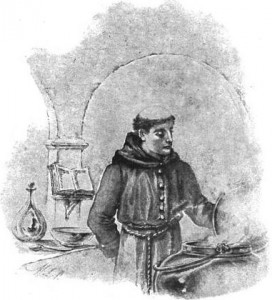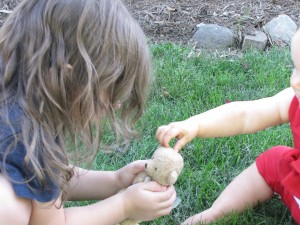To hear my blog post read aloud, just click the play button. If you’re reading this in an email, you may have to click here to hear the post on my site.












We must know before we can love. In order to know God, we must often think of Him. And when we come to love Him, we shall then also think of Him often, for our heart will be with our treasure.
You need not cry very loud. He is nearer to us than we are aware. Every one is capable of such familiar conversation with God; some more, some less. He knows what we can do. Let us begin then. Perhaps He expects but one generous resolution on our part. Have courage.
Art credits: The Good Shepherd by James Tissot; Anointing of David by Alexandr Ivanov; Brother Lawrence in the Kitchen in a book published by Fleming Revell Co.


And this is my prayer: that your love may abound more and more in knowledge and depth of insight, so that you may be able to discern what is best and may be pure and blameless for the day of Christ, filled with the fruit of righteousness that comes through Jesus Christ—to the glory and praise of God. ~Philippians 1.9-11 (Italics mine)
I know what it is to be in need, and I know what it is to have plenty. I have learned the secret of being content in any and every situation, whether well fed or hungry, whether living in plenty or in want. I can do all this through him who gives me strength. ~Philippians 4.12-13

*etching is “Faust” by Rembrandt
*edited from the archives




“Young people tend to be activists, dedicated supporters of a cause, though without always inquiring too closely either whether their cause is a good end to pursue or whether this action is the best means by which to pursue it.” ~ Rev. John R. W. Stott in an address at the Inter-Varsity Fellowship Annual Conference
Great indeed, we confess, is the mystery of godliness; He was manifested in the flesh, vindicated by the Spirit, seen by angels, proclaimed among the nations, believed on in the world, taken up in glory. ~ I Timothy 3.16




…the important truths, that knowledge is power, that knowledge is safety, and that knowledge is happiness. ~ Thomas Jefferson
Childhood is motivated by wonder, and the task of adulthood is not to eliminate wonder but to expand it. ~ Ken Myers





Our attempt to speak confidently of God in the face of modern skepticism, a skepticism we suspect also grips our lives as Christians, betrays a certainty inappropriate for a people who worship a crucified God. ~ Stanley Hauerwas






What we believe always remains intellectually possible; it never becomes intellectually compulsive. I have an idea that when this ceases to be so, the world will be ending. We have been warned that all but conclusive evidence against Christianity, evidence that would deceive (if it were possible) the very elect, will appear with Antichrist. And after that there will be wholly conclusive evidence on the other side.
But not, I fancy, till then on either side. ~ C.S. Lewis
Art credits: DNA photo by Tomislav Alajbeg; Pulsar and Supernova photos from NASA
Why are so many Christians afraid of science?
So many Christians get incredibly defensive and angry when it comes to debates and discussions about science, particularly when our origin is the topic under scrutiny. People will argue fiercely and loudly against theories such as evolution or big bang cosmology.
Some would even go so far as to state that Christians cannot also be scientists.
Why do we get so defensive and angry?
Fear.
While most would not admit it, many are, deep down inside, afraid that if such theories are true than their God does not exist. They fear that God is unable to defend Himself and so they get angry in order to drive out their fear.
For you did not receive a spirit that makes you a slave again to fear, but you received the Spirit of sonship.
I have fear too.
I am afraid that this divide between Christians and science is driving people away from our faith rather than drawing them in.
How can we possibly think that science could destroy God? How can we believe that science could ever come up with a truth that would cause God to cease to exist?
We worship and serve God Who is Truth and science cannot help but point to Him.
Perhaps part of the trouble is that Christians have mistaken the purpose of science.
Science tries to figure out how things work. Science does not give ultimate explanation for the origin and existence of the universe or answer questions concerning the purpose of the universe or of our existence.
What if evolution is true? What if the big bang theory is true? Does that take God out of the picture at all?
God created our universe. The Bible is clear on that point.
As Richard T. Wright writes in Biology Through the Eyes of Faith:
Whether you believe that His gifts were bestowed at the outset of creation, or periodically over time, or all at once recently, you should see design in what He has done. What we see doesn’t prove His existence, but it does point people in the right direction, and for Christians, what we see and learn should cause us to thank Him and give Him the glory for such a wonderful creation.
Why should we fear science when science can give us more and more insight into how beautiful and complex is God’s design? Science doesn’t deny God, science glorifies God!
God reveals Himself through His Word:
All Scripture is God-breathed and is useful for teaching…
God also reveals Himself through His created world:
For since the creation of the world God’s invisible qualities – His eternal power and divine nature – have been clearly seen, being understood from what has been made, so that men are without excuse.
Why do we try to throw out one of His revelations?
At the end of one of his papers, the biologist David Wilcox says this:
In our speculations, we must be limited by God’s self-revelations – both by Scripture and in His created world. As we seek to be guided by these two sources of truth, let us humbly acknowledge that our interpretations of both sources of knowledge are worldview guided and fallible. We will always need to be guided – and corrected – by the Spirit of Truth, in science or in theology. And when we get home…won’t we have a good laugh at ourselves?!
Perhaps we should trust God. Trust that He is able to defend Himself, trust that He is Truth and that science can never knock Him off His throne.
Whether you believe that the earth is young or old, whether you believe that we humans were created in one day or over billions of years through evolution, when we have debates and discussions with other Christians and with non-Christians, please remember that the most important thing to God is not our origin but that we love Him and love each other.
It is not wrong to have your opinion, to study science and debate with others about various issues, but don’t fear those who disagree–love them. In the end, our love and respect, our willingness to listen and prayerfully consider new ideas is a much stronger way to show Jesus to the world around us than attacking others or becoming defensive out of fear.
…But perfect love drives out fear…
Over the years, I have realized that even though it is necessary to look at these origins issues and problems, the more important problems are those that are facing us today as we try to learn how to take care of the creation and how best to use its gifts. (If God were to ask us a question about His Creation,) would He ask us what we thought about how He made the world, or would He ask us what we did with it?
“This is one of the most beautiful things to me.”
I look at her, my mommy-shepherd, wanting her to continue.
“A mother who knows her baby, who knows what her baby needs by being completely attuned to the cues her baby gives her.”
Yes. This is beautiful.
Our conversation drifts to the back of my mind until I am reading Psalm 139, which begins like this:
O Lord, you have searched me and you know me.
My mind leaps back to the beauty of a mother knowing her baby as I read more of the psalm:
…you perceive my thoughts from afar…you are familiar with all my ways. Before a word is on my tongue you know it completely, O Lord…For you created my inmost being; you knit me together in my mother’s womb…All the days ordained for me were written in your book before one of them came to be.
God knows me.
God, the One Who weighs the clouds heavy with snow, knows me even more deeply than a mommy can know her baby.
This is beautiful.
And then I read something that I have read many times. This time, with the beauty of God’s knowledge of me fresh in my mind, I am stunned.
Now we see but a poor reflection as in a mirror; then we shall see face to face. Now I know in part; then I shall know fully, even as I am fully known.
The wonder of this takes my breath away and I want to check, to be sure this is true.
I know that the Old and New Testaments were written in different languages, but I check my Strong’s for the meanings of “know” in both chapters and they are remarkably similar. It is the same kind of knowing.
We will know God as deeply as He knows us.
Stop for just a moment and let that fill up your heart.
Lately my heart has been too full of the mystery of God. I often struggle to see Him in the midst of the busyness, the hurts and disappointments of life.
My heart needs to hear this, to savor it: God wants me to know Him.
I search for more of this truth. If you, too, need this, go slowly. Let God breathe these words into your distant heart and draw you close to Him.
I am the good shepherd; I know my sheep and my sheep know me – just as the Father knows me and I know the Father.
I keep asking that the God of our Lord Jesus Christ, the glorious Father, may give you the Spirit of wisdom and revelation, so that you may know him better.
For I desire mercy and not sacrifice, and the knowledge of God more than burnt offerings.
This is what the LORD says: ‘Let not the wise man boast of his wisdom…but let him who boasts boast about this: that he understands and knows me, that I am the LORD.’
I will give them a heart to know me, that I am the LORD.
I am filled with this beauty.
God knows all of the deepest pieces of me and in all of His knowledge of my dark places, He desires that I know Him just as deeply.
Beautiful.
Scriptures in order: I Corinthians 13.12; John 10.14-15; Ephesians 1.17; Hosea 6.6; Jeremiah 9.23-24; Jeremiah 24.7
Painting is Christ in the House of Martha and Mary by Johannes Vermeer
Education is the atmosphere we breathe, the envelope of wonder that surrounds us, held by the gravity of our daily habits. ~ Ann Voskamp of A Holy Experience
For in Him we live and move and have our being. ~ Acts 17.28
We can begin by regularly reminding ourselves that the God who saves us is the God who made us and all things, that our message of redemption only makes sense in the context of the bigger story about creation. Our God cares about all aspects of our lives, and thus the renewing of our minds is as needful as the cleansing of our hearts.
Loving God and neighbor requires knowledge of the truth about God and the truth about the many challenges and opportunities of human experience in the world God has made.
The second word, the word that Peter urges us to add to our faith along with goodness, self-control, perseverance godliness, brotherly kindness and love? This word is gnosis (general intelligence, understanding, implying science).
Creation knowledge.
Aha.
Once again, all is related, all is woven together into one beautiful, seamless fabric.
Learning, gaining knowledge, is a large part of how we weave the various parts of our lives together into a seamless, sacred whole. Not something to be relegated to school-type hours.
We seek for epignosis, to become thoroughly acquainted with God, so that we may have everything we need for life and godliness.
We seek for gnosis, general understanding about the world He has created, so that we may keep from being ineffective and unproductive in our epignosis of our Lord Jesus Christ.
May we remain in awe of God and retain our sense of wonder in the world (including its creatures, human and otherwise) He has created. May we continue to pursue knowledge in every moment of our daily lives and turn that knowledge into praise and thanksgiving, into loving of all those around us.
art credit: Elizabeth Barrett Browning; Christ in the House of Martha and Mary by Johannes Vermeer